Related Research Articles

Highway 61 Revisited is the sixth studio album by American singer-songwriter Bob Dylan, released on August 30, 1965, by Columbia Records. Having until then recorded mostly acoustic music, Dylan used rock musicians as his backing band on every track of the album, except for the closing track, the 11-minute ballad "Desolation Row". Critics have focused on the innovative way Dylan combined driving, blues-based music with the subtlety of poetry to create songs that captured the political and cultural chaos of contemporary America. Author Michael Gray has argued that, in an important sense, the 1960s "started" with this album.

Hiram "Hank" Williams was an American singer-songwriter. He is regarded as one of the most significant and influential American singers and songwriters of the 20th century. Williams recorded 55 singles that reached the top 10 of the Billboard Country & Western Best Sellers chart, five of which were released posthumously, including 12 that reached No. 1, three after his death.

Blonde on Blonde is the seventh studio album by American singer-songwriter Bob Dylan, released as a double album on June 20, 1966, by Columbia Records. Recording sessions began in New York in October 1965 with numerous backing musicians, including members of Dylan's live backing band, the Hawks. Though sessions continued until January 1966, they yielded only one track that made it onto the final album—"One of Us Must Know ". At producer Bob Johnston's suggestion, Dylan, keyboardist Al Kooper, and guitarist Robbie Robertson moved to the CBS studios in Nashville, Tennessee. These sessions, augmented by some of Nashville's top session musicians, were more fruitful, and in February and March all the remaining songs for the album were recorded.
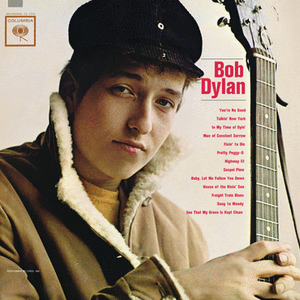
Bob Dylan is the debut studio album by American singer-songwriter Bob Dylan, released on March 19, 1962 by Columbia Records. The album was produced by Columbia talent scout John H. Hammond, who had earlier signed Dylan to the label, a controversial decision at the time. The album primarily features folk standards but also includes two original compositions, "Talkin' New York" and "Song to Woody". The latter was an ode to Woody Guthrie, a significant influence in Dylan's early career.

Time Out of Mind is the thirtieth studio album by American singer-songwriter Bob Dylan, released on September 30, 1997, through Columbia Records. It was released as a single CD as well as a double studio album on vinyl, his first since The Basement Tapes in 1975.
"I'm So Lonesome I Could Cry" is a song written and recorded by American country music singer-songwriter Hank Williams in 1949. The song has been covered by a wide range of musicians.
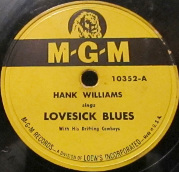
"Lovesick Blues" is a Tin Pan Alley song, composed by Cliff Friend, with lyrics by Irving Mills. It first appeared in the 1922 musical "Oh, Ernest", and was recorded that year by Elsie Clark and Jack Shea. Emmett Miller recorded it in 1925 and 1928, followed by country music singer Rex Griffin in 1939. The recordings by Griffin and Miller inspired Hank Williams to perform the song during his first appearances on the Louisiana Hayride radio show in 1948. Receiving an enthusiastic reception from the audience, Williams decided to record his own version despite initial push back from his producer Fred Rose and his band.
"Ramblin' Man" is a song written in 1951 by Hank Williams. It was released as the B-side to the 1953 number one hit "Take These Chains from My Heart", as well as to the 1976 re-release of "Why Don't You Love Me". It is also included on the 40 Greatest Hits, a staple of his CD re-released material.

By 1965, Bob Dylan was the leading songwriter of the American folk music revival. The response to his albums The Freewheelin' Bob Dylan and The Times They Are a-Changin' led the media to label him the "spokesman of a generation".
"You Ain't Goin' Nowhere" is a song written by American musician Bob Dylan in 1967 in Woodstock, New York, during the self-imposed exile from public appearances that followed his July 29, 1966 motorcycle accident. A recording of Dylan performing the song in September 1971 was released on the Bob Dylan's Greatest Hits Vol. II album in November of that year, marking the first official release of the song by its author. Earlier 1967 recordings of the song, performed by Dylan and the Band, were issued on the 1975 album The Basement Tapes and the 2014 album The Bootleg Series Vol. 11: The Basement Tapes Complete.
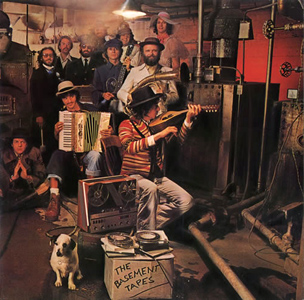
The Basement Tapes is the sixteenth album by American singer-songwriter Bob Dylan and his second with the Band. It was released on June 26, 1975, by Columbia Records. Two-thirds of the album's 24 tracks feature Dylan on lead vocals backed by the Band, and were recorded in 1967, eight years before the album's release, in the lapse between the recording and subsequent release of Blonde on Blonde and John Wesley Harding, during sessions that began at Dylan's house in Woodstock, New York, then moved to the basement of Big Pink. While most of these had appeared on bootleg albums, The Basement Tapes marked their first official release. The remaining eight songs, all previously unavailable, feature the Band without Dylan and were recorded between 1967 and 1975.
"Why Don't You Love Me" is a song by American singer and guitarist Hank Williams. The song reached number one on the U.S. Country & Western chart. It was released as a single in 1950 with the B-side, "A House Without Love".
"You Win Again" is a 1952 song by Hank Williams. In style, the song is a blues ballad and deals with the singer's despair with his partner. The song has been widely covered, including versions by Ray Charles, Jerry Lee Lewis, Roy Orbison, the Grateful Dead, Charley Pride, Bob Dylan, and the Rolling Stones.
"Lost Highway" is a country music song written and recorded by blind country singer-songwriter Leon Payne in 1948. It was released in October 1948 on Nashville-based Bullet label.
"My Bucket's Got a Hole in It" is a song widely attributed to Clarence Williams, who obtained a copyright in 1933, although the melody was recorded under various names years earlier. The song became popular performed by Hank Williams for MGM and reached number 4 on the country chart in 1949.
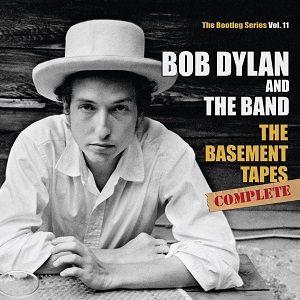
The Bootleg Series Vol. 11: The Basement Tapes Complete is a compilation album of unreleased home recordings made in 1967 by Bob Dylan and the group of musicians that would become the Band, released on November 3, 2014 on Legacy Records. It is the ninth installment of the Bob Dylan Bootleg Series, available as a six-disc complete set, and as a separate set of highlights – in a two-disc format common to the rest of the series – entitled The Basement Tapes Raw.
"A Mansion on the Hill" is a song written by Hank Williams and Fred Rose and originally recorded by Williams on MGM Records. It peaked at No. 12 on the Most Played Jukebox Folk Records chart in March 1949.
"I Can't Escape from You" is a song written by Hank Williams. The song was originally recorded as a demo by Williams probably in 1951 but he never recorded it in a studio with a band. MGM released an overdubbed version in 1953 with backing from the Drifting Cowboys. The song contains the bitter testimony of a man haunted by the memory of a woman who has "a heart of stone." Like many of the demos that feature just Williams and his guitar, the original performance is artlessly affecting and displays his spare, haunting lyrics:
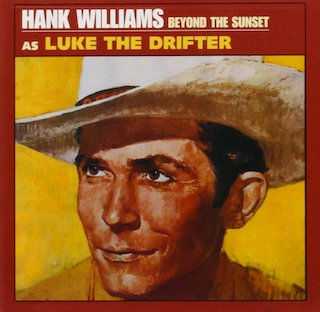
Hank Williams as Luke the Drifter is an LP by Hank Williams released by MGM Records in 1954. It features narrations that Williams released under the pseudonym Luke the Drifter.
"The Love that Faded" is a song by Bob Dylan. It contains lyrics by Hank Williams to which Dylan composed music and appears on the 2011 LP The Lost Notebooks of Hank Williams.
References
- ↑ "U.S. Copyright Office Virtual Card Catalog 1946-1954". vcc.copyright.gov. Retrieved 2021-09-09.
- ↑ Escott, Colin (2004). Hank Williams: The Biography. Back Bay. p. 74. ISBN 0-316-73497-7.
- ↑ Dylan, Bob (2004). Chronicles: Volume One . Simon & Schuster. p. 95. ISBN 0-7432-2815-4.